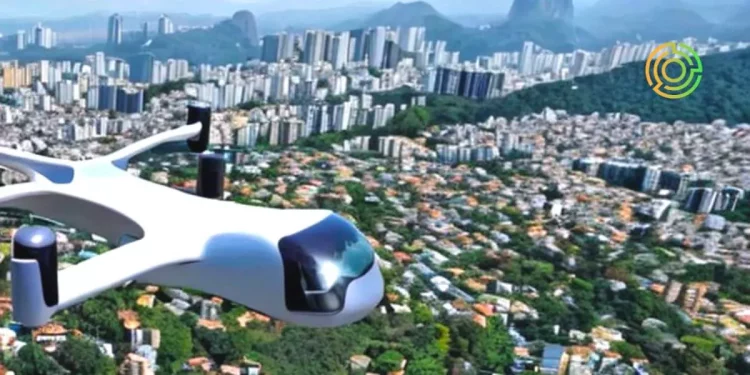Electric aircraft manufacturer Eve Holding Inc has announced plans to launch a commercial electric flying taxi service in 2026.
Before that date, the company will have to obtain official certification for its aircraft, as there are still no clear regulations for this sector.
Brazil to transform urban mobility with electric flying taxi starting in 2026
Eve is a subsidiary of Brazilian aerospace manufacturer Embraer, which has already started the certification process for its new aircraft. As a preliminary step, the company has already accumulated more than 2,770 orders for its electric vertical take-off and landing vehicles (eVTOLs), but production cannot begin until the model receives official certification.
Although the series production of these vehicles is frozen, the company already has the necessary funds to start industrial and transport operations. According to initial estimates, the overall project will cost at least US$540 million.
“The company expects the authorities to move forward in establishing official regulations for the sector. “This service is a very important development, but we still have to certify the aircraft, which is always a big challenge,” says Luiz Mauad.
Eve has been listed on the New York Stock Exchange since May 2022 and has among its investors well-known brands such as United Airlines, Acciona SA, SkyWest Inc, Bradesco BBI, Rolls-Royce, Thales, and BAE Systems. “The investment made gives us the peace of mind to develop all the products until launch,” Mauad said.
Services such as the one Eve intends to offer, through electric flying cabs, have the potential to improve urban mobility, reduce travel time and reduce traffic congestion. In addition to the connectivity aspects, on an environmental level, eVTOLs can help reduce greenhouse gas emissions and air pollution.
Eve takes an important step in Brazil, setting a precedent in the transformation of air transport with its cutting-edge technology and its commitment to safety, efficiency, and sustainability.
Flying taxis are a reality: New York has already carried out the first service
The six-passenger aircraft took off from Westchester County Airport in White Plains, New York, some 60 kilometers from midtown Manhattan. This is the first test service for flying cabs.
It is an all-electric Alia-250 eVTOL aircraft, developed by Blade Air Mobility and Beta Technologies. The goal of the two companies is to have it in official service by 2025.
According to Beta, the flight was the first with an eVTOL aircraft flown in the New York area. The aircraft flew to Westchester from the company’s Plattsburgh test facility.
During the test, the flying cab made a stop in Schenectady to recharge its batteries. The manufacturer already has three recharging stations in the state and four other sites are under development.
The eVTOL, which did not fly itself, flanked a helicopter and then completed a solo ride over the airport to demonstrate its low-noise profile. According to Beta, the eVTOL vehicle generates only one-tenth the noise levels of a typical helicopter.
Rob Wiesenthal, CEO of Blade, said “This demonstration is very important in our transition from helicopters to electric vertical aircraft and we are pleased that our partners at Beta have designed an aircraft with the capability, profile, and noise range needed for use in our markets, including our New York base.”
Over the past three years, Beta has flight-tested two full-scale prototypes while working toward FAA certification in 2024. In collaboration with the FAA and the National Aeronautics Research Institute, the company has also conducted a 50-foot drop test of its full-scale battery packs.
Dubai also joins in
Six years after presenting the project, the Prime Minister of the United Arab Emirates (UAE) and Emir of Dubai, Mohamed bin Rashid, announced the approval of the designs for the new flying cab stations in that country with zero carbon emissions.
“Today we approved the design of Dubai’s new flying cab stations, which will be ready in three years,” the emir of Dubai said on his Twitter account on the eve of the opening of the World Government Summit.
Although details of what the service and its regulation will look like are unknown, the first stage includes four initial stations near the city center, Dubai International Airport, Palm Jumeirah, and Dubai Marina.
The flying cabs would have a range of 241 kilometers with a speed of 300 kilometers per hour and the capacity to carry four passengers.
Dubai would be “the first city to have a vertical take-off and landing network” with zero carbon emissions.
Follow us on our social networks and keep up with everything that happens in the Metaverse!
Twitter Linkedin Facebook Telegram Instagram Google News












































